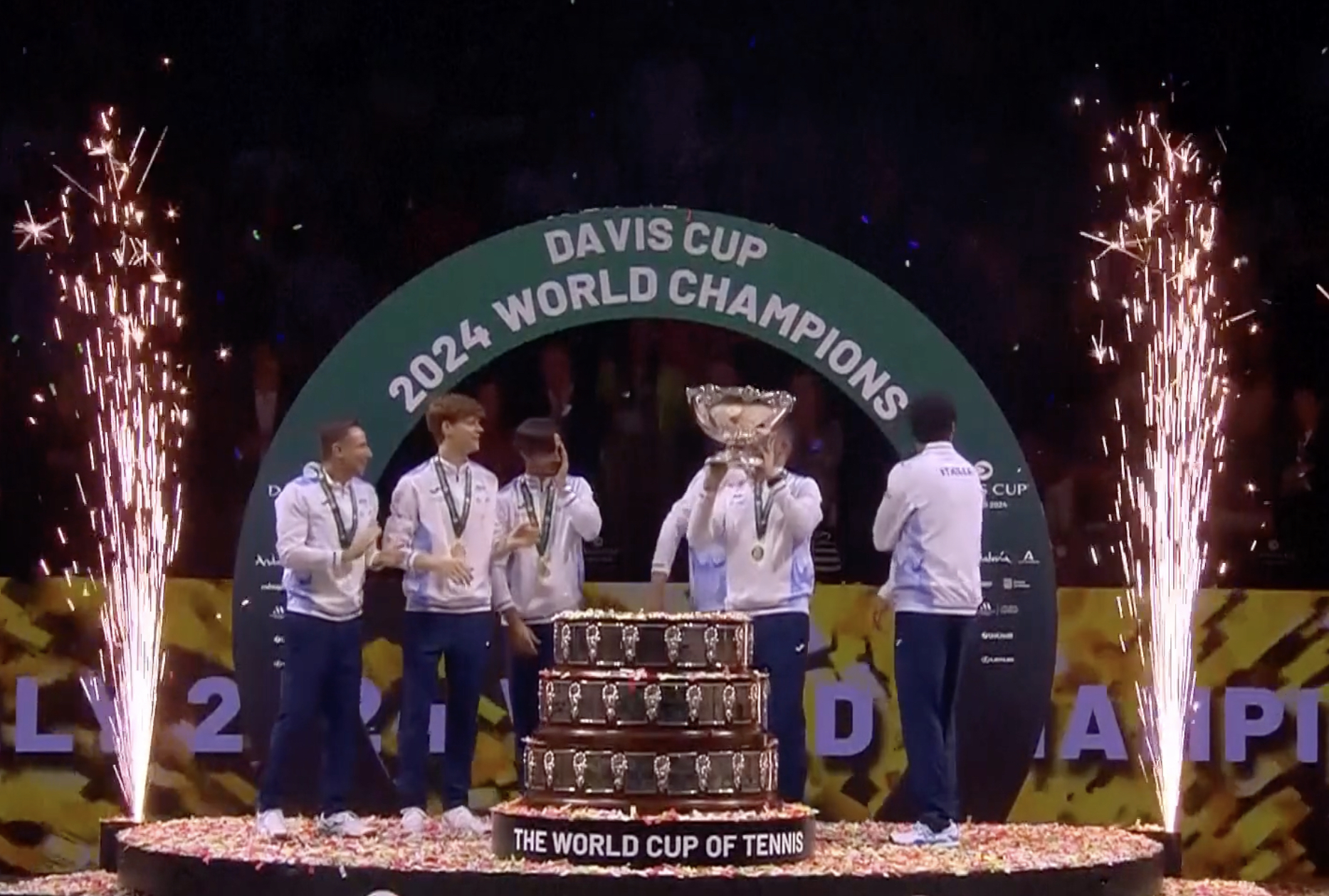Italian tennis renaissance: triumphed in Davis Cup and Billie Jean King Cup

Last Updated on 15 March 2025 by Racket One
Both of the top team tournaments were won by Italy this year.
This marks Italy’s second consecutive win and third overall, with their first triumph in 1976. Furthermore, Italy is the first team in a decade to successfully defend its Davis Cup crown. On the women’s side, it’s a historic fifth title, breaking an 11-year drought. Racket One examines the phenomenon behind Italy’s resurgence and highlights other national teams that made a significant impact this year.
Italy and the Netherlands faced off in the Davis Cup final, with the Dutch reaching their first-ever final. In addition, the Netherlands pulled off a major surprise by eliminating Spain in the quarterfinals. Incidentally, Rafael Nadal, who was defeated in two sets by Botic Van de Zandschulp, played what might be his final career match in Malaga.
In the semifinals, the Dutch faced a tough challenge but managed to defeat Germany. The most dramatic match was between Botic Van de Zandschulp and Daniel Altmaier, where the second-set tiebreak ended 14–12 in favor of the German. However, the Dutchman came back strong in the third set.
On the other side of the draw, Italy encountered some resistance from Argentina in the quarterfinals. Francisco Cerundolo comfortably defeated Lorenzo Musetti 6–4, 6–1, while Sebastian Baez had no chance against Jannik Sinner, losing 6–2, 6–1. Everything was decided in the deciding doubles match, where Berrettini and Sinner defeated Molteni and Gonzalez 6–4, 7–5.
Next for the Italians was a semifinal against Australia, who had pulled off an unlikely victory over the USA. An even more dramatic tiebreak unfolded in the match between Ben Shelton and Thanasi Kokkinakis, with Kokkinakis winning 16–14. Against Australia, the Italians only needed two victories to secure the win, with both Berrettini and Sinner delivering crucial points.
The final outcome followed expectations. Botic Van de Zandschulp had a chance if he could overcome Berrettini, but their head-to-head record stood at 0–4 in favor of the Italian. The Dutchman would have needed to produce something extraordinary, but that didn’t happen. It’s hard to argue that Jannik Sinner is arguably one of the strongest players on the planet, and as a result, Griekspoor had no chance.

The success of the Italian national team is not solely due to having the world’s top-ranked player. A strong supporting cast — including Musetti, Cobolli, Berrettini, Arnaldi, Darderi, and Sonego — has created a formidable lineup. At this tournament, however, the spotlight was on Berrettini. If the 2021 Wimbledon finalist can stay injury-free, he has the potential to deliver his best tennis, as he proved brilliantly in Málaga.
While Italy was expected to replicate last year’s success, the Netherlands achieved a remarkable breakthrough, displaying impressive resilience. It’s an extraordinary accomplishment for a team whose best Davis Cup result had been a semifinal appearance back in 2001.
In the Billie Jean King Cup, despite Italy’s triumph, the true spotlight shines on the resurgence of Slovakia. For the first time in 22 years, the Slovak team reached the final, defeating the USA, Australia, and Great Britain along the way. Both the American and British matchups saw the Slovaks bounce back from losing the opening singles matches to clinch overall victories. In the semifinals, US Open 2021 champion Emma Raducanu beat Viktoria Grinčáková 6–4, 6–4, but Rebecca Šramková leveled the score with a gritty win over Katie Boulter 2–6, 6–4, 6–4. Grinčáková and Teresa Migáľová then sealed Slovakia’s success with a decisive doubles victory.

Italy, meanwhile, overcame Japan in the quarterfinals. Although Ena Shibahara defeated Elisabetta Cocciaretto, Jasmine Paolini turned the tide, first beating Moyuka Uchijima and then pairing with Sara Errani to secure victory against the Aoyama/Hozumi duo.
Italy then faced a gripping semifinal against Poland, which ended with world No. 2 Iga Świątek in tears. Although Świątek secured a victory over Italy’s top player, Jasmine Paolini, she and Katarzyna Kawa were ultimately outplayed by the resilient Paolini-Errani duo. The Italians staged a stunning comeback, rallying from 1–5 down in the second set to clinch a pivotal win.
In the final, Italy overcame Slovakia in dominant fashion. Lucia Bronzetti defeated Viktoria Grinčáková 6–2, 6–4, while Jasmine Paolini sealed the victory with a decisive 6–2, 6–1 win over Rebecca Šramková.
This remarkable achievement made Italy only the third nation in history—and the first in 33 years — to have both its men’s and women’s teams reach the finals of the Davis Cup and Billie Jean King Cup in consecutive years. While the women’s team fell short last year, they avenged that disappointment with a spectacular triumph this season.
Contribution to Tennis Europe Awards
The results of the Davis Cup and Billie Jean King Cup have significantly contributed to the Tennis Europe Awards ranking. The winner earns 1000 points, the finalist receives 750 points, and each semi-finalist is awarded 500 points.
In the Davis Cup, Italy emerged victorious, securing 1000 points towards the Tennis Europe Awards ranking. The Netherlands finished as the runner-up, adding 750 points. Germany and Spain reached the semi-finals, each earning 500 points.
In the Billie Jean King Cup, Italy once again claimed the title, earning 1000 points. Slovakia finished in second place, receiving 750 points. Poland and the UK reached the semi-finals, each contributing 500 points to their standings.
These results highlight Italy’s consistent dominance in both competitions, firmly placing them at the top of the Tennis Europe Awards ranking this year.
For more details, visit our Tennis Europe Awards section on the website.
Cover photo: daviscup.com




